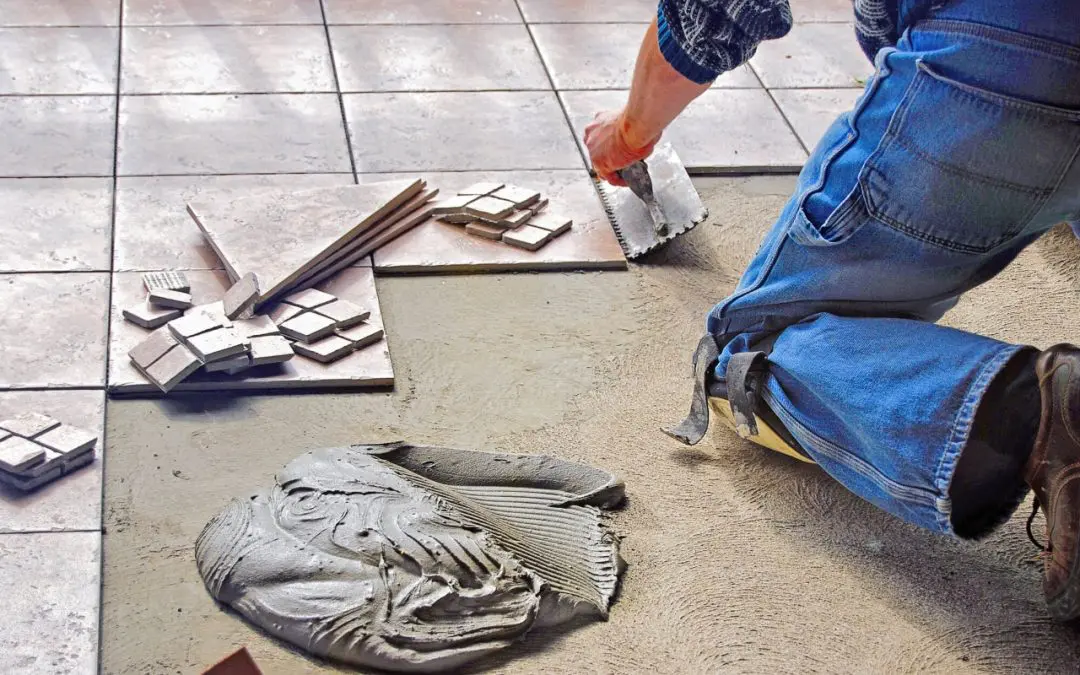Updating your bathroom flooring enhances the space’s aesthetics and functionality. This blog post will guide you through the options available to help you make an informed choice that aligns with your style, budget, and practical needs.
Porcelain and Ceramic Tiles
Porcelain and ceramic tiles are popular choices for bathroom flooring due to their durability and water resistance. These materials are crafted from clay and fired at high temperatures, creating a hard, non-porous surface. Porcelain is particularly dense and less porous than ceramic, making it an excellent choice for high-moisture areas like bathrooms.
Porcelain and ceramic tiles come in an array of colors, patterns, and finishes. You can opt for tiles that mimic the look of natural stone, wood, or even concrete, providing a versatile design palette. They are easy to clean and maintain, though the grout lines sometimes require extra care to prevent mold and mildew growth.
Natural Stone Bathroom Flooring
Natural stone flooring, such as marble, granite, limestone, and slate, offers a luxurious and timeless look. Each stone has unique patterns and colors, adding character to your bathroom. However, natural stone requires sealing to prevent water absorption and staining. Choosing a slip-resistant finish is essential to ensure safety in wet conditions.
Marble and granite are more durable options, while limestone and slate may require more maintenance. Despite the higher cost and upkeep, many homeowners find the elegance and durability of natural stone worth the investment.
Vinyl Flooring
Vinyl flooring has come a long way from its early days and is now a practical and stylish bathroom option. Available in sheets, tiles, or planks, vinyl is resilient, waterproof, and comfortable underfoot. It can mimic the look of more expensive materials like wood or stone, providing a budget-friendly yet attractive solution.
One of vinyl’s advantages is its ease of installation. DIYers can install peel-and-stick vinyl tiles or click-lock vinyl planks. Vinyl is also easy to clean and maintain, making it a hassle-free choice for busy households.
Engineered Wood
Engineered wood is a good option for those who desire the warmth and beauty of wood in their bathroom. Unlike solid hardwood, engineered wood has a top layer of natural wood veneer bonded to layers of plywood. This construction makes it more stable and less susceptible to moisture and temperature fluctuations.
Engineered wood can be finished in various styles and has a more authentic wood appearance than vinyl or laminate. However, to preserve the flooring’s longevity, it’s crucial to maintain proper ventilation in the bathroom and promptly clean up any water spills.
Laminate Bathroom Flooring
Laminate flooring is another cost-effective alternative that can replicate the appearance of hardwood, stone, or tile. It comprises a photographic layer sandwiched between a transparent protective top layer and a high-density fiberboard core. Laminate is durable and easy to install. While it is more moisture-resistant than traditional hardwood, it’s not entirely waterproof. Therefore, it’s best suited for powder rooms or guest bathrooms where water exposure is minimal.
Cork Flooring
Cork flooring is an eco-friendly option that is rising in popularity. Harvested from the bark of cork trees, cork is a renewable resource that offers natural warmth and softness underfoot. It is also hypoallergenic and resistant to mold and mildew, making it an excellent choice for bathrooms.
Cork must be sealed properly to protect against water damage. It is comfortable to stand on for extended periods and provides sound insulation, adding to its appeal in busy households.
Choosing the right bathroom flooring involves considering aesthetics, durability, maintenance, and budget. Now that you understand the pros and cons of each material, you’ll make a confident decision that will improve your bathroom.
Bathroom Flooring FAQs
How do I make my bathroom flooring slip-resistant?
Choose tiles with textured surfaces or matte finishes to ensure your bathroom flooring is slip-resistant. Smaller tiles with more grout lines can provide extra traction. For other materials, look for flooring specifically designed for wet areas with a certified slip-resistance rating.
Can I install heated flooring under my bathroom tiles?
Yes, heated flooring can be installed under most bathroom tiles, including porcelain, ceramic, and natural stone. Electric or hydronic (water-based) radiant heating systems provide comfortable, evenly distributed heat.
Are there any special considerations for installing flooring in a basement bathroom?
For basement bathrooms, moisture-resistant and durable flooring is essential. Vinyl, porcelain, and ceramic tiles are excellent choices. The subfloor should be prepared properly to prevent moisture issues, and a vapor barrier should be used to protect the flooring.
Home Support Property Inspections offers professional inspections to customers in Maryland and DC. Contact us to request our services.

